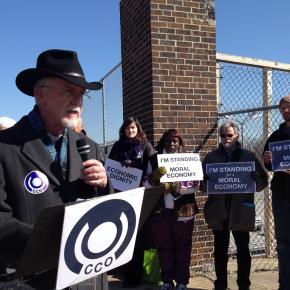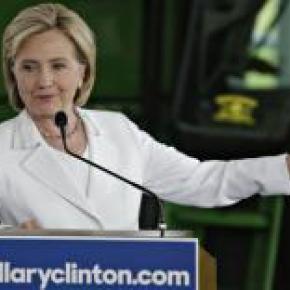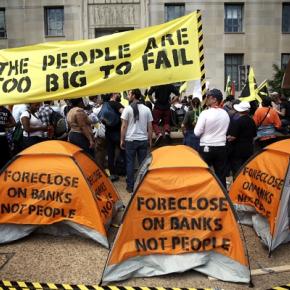These Activists Marched From Charlottesville To D.C. To Let Everyone Know That 'White Supremacy Is Real'

These Activists Marched From Charlottesville To D.C. To Let Everyone Know That 'White Supremacy Is Real'
We previously reported that a coalition of activists were planning a 10-day march from Charlottesville to D.C. called...
We previously reported that a coalition of activists were planning a 10-day march from Charlottesville to D.C. called The March to Confront White Supremacy.
Well, the march has been successfully completed!
Read the full article here.
Immigrants, Advocates Rally For New York State Citizenship
CBS New York - June 16, 2014 - They are not U.S. citizens, but a plan is in the works to allow undocumented New Yorkers...
CBS New York - June 16, 2014 - They are not U.S. citizens, but a plan is in the works to allow undocumented New Yorkers to become citizens of the state.
Chanting “New York is my home” and with the Statue of Liberty in the background, immigrants and their advocates rallied for New York state citizenship in Battery Park on Monday, WCBS 880′s Peter Haskell reported.
The bill’s sponsor, state Sen. Gustavo Rivera, D-Bronx, said the legislation would grant state citizenship if “someone can demonstrate proof of identity, live here for three consecutive years, pay taxes for three consecutive years.”
Assemblyman Karim Camara, D-Brooklyn, said state citizenship would allow 2.7 million immigrants to legally drive, vote in state and local elections and receive tuition aid.
“We have the opportunity now to step in where the federal government has not and make New York stronger by strengthening the rights of new immigrants,” Camara said.
The bill is not likely to pass, but is being called a conversation starter, Haskell reported.
“We deserve to receive the aid necessary for us to go to college,” said Antonio Alarcon, 19. “We deserve to vote. We deserve to drive.”
Source
Promueven petición contra Wells Fargo y JPMorgan por “financiar el dolor” de inmigrantes

Promueven petición contra Wells Fargo y JPMorgan por “financiar el dolor” de inmigrantes
La petición cuenta con el respaldo de más de 70 organizaciones bajo el paraguas de la coalición #FamiliesBelongTogether...
La petición cuenta con el respaldo de más de 70 organizaciones bajo el paraguas de la coalición #FamiliesBelongTogether, que incluye a Presente.org, la Unión de Libertades Civiles de EEUU (ACLU), MoveOn.org, Amnistía Internacional, la Alianza Nacional de Trabajadoras Domésticas, MomsRising, Center for Popular Democracy, y Make the Road New York, entre otras.
Lea el artículo completo aquí.
Kansas And Missouri Activists Gather On Troost To Stand For 'Moral Economy'
NPR - March 6, 2015, by Cody Newill - Community activists and faith leaders from Kansas and Missouri rallied at the...
NPR - March 6, 2015, by Cody Newill - Community activists and faith leaders from Kansas and Missouri rallied at the intersection of 63rd Street and Troost Avenue Thursday, calling for a "moral economy."
One issue that several speakers focused on was a recent comment by Federal Reserve Bank of Kansas City president Esther George suggesting that interest rates may be increased to combat inflation.
Rev. Stan Runnels of St. Paul's Episcopal Church believes that raising interest rates now would hurt low-wage earners and undo economic progress that has been slowly mounting in the last several years.
"Right now, there is some opportunity for us to move in the direction of an improved economy," Runnels said. "We're concerned that if we begin dabbling with these other metrics, like worrying about inflation, we could scramble that up."
The rally was held outside a fast-food restaurant and payday loan lender, which organizer Andrew Kling with the group Communities Creating Opportunity says is symbolic of the economic troubles that face minorities.
"These are two of the greatest challenges that working people face in this economy: low wages and predatory industries that thrive on taking away the wealth and earnings of working people struggling to get through," Kling said. "We should not accept double-digit unemployment in the black community as normal."
The activists also called for an end to the U.S. Bureau of Labor Statistics' use of averaged unemployment rates, which they say ignores racial disparities. For example, Kansas City's unemployment rate as a whole sits around 5 percent, but the rate of black citizens without jobs is 12.6 percent.
The Bureau of Labor Statistics released its February employment statistics Friday, which showed the U.S. economy as a whole at 5.5 percent unemployment.
Source
Democrats are back in the fight for the Arizona Eighth Congressional District: All Bets are Off.

Democrats are back in the fight for the Arizona Eighth Congressional District: All Bets are Off.
Trump won by over 20 points, the Democrat leads in fundraising as well, aided in part by Ady Barkan, a wealthy...
Trump won by over 20 points, the Democrat leads in fundraising as well, aided in part by Ady Barkan, a wealthy Democratic activist with the Center for Popular Democracy who was recently diagnosed with A.L.S. (Lou Gehrig’s Disease). In speaking with Bill Roe, the First Vice Chair of the Arizona Democratic Party, he indicated that this race is unpredictable for several reasons.
Read the full article here.
Jackson Hole Demonstrators Rally Against Rate Hike
Associated Press - August 22, 2014, by Matthew Brown — Shadowing central bankers and economists at the annual Federal...
Associated Press - August 22, 2014, by Matthew Brown — Shadowing central bankers and economists at the annual Federal Reserve conference here, a group of about 10 demonstrators pressed Fed Chair Janet Yellen not to yield to pressure to raise interest rates.
Carrying placards and green T-shirts embossed with the slogan "What recovery?" they said they'd come from New York, Missouri, Minnesota and elsewhere to draw attention to people left behind by the recovery and still unable to find work.
One demonstrator approached Yellen to press his point as she prepared to enter the opening reception Thursday night. With security guards hovering nearby, the two shook hands and spoke for about a minute before Yellen entered the closed-door gathering.
Yellen spokesman Doug Tillett said her staff would seek to arrange a meeting between the chair and the demonstrators back in Washington.
Their message was generally in sync with Yellen's stance since she became Fed chair in February to keep rates low to help support a still-subpar economy. In a speech to the conference Friday, Yellen noted that while the unemployment rate has steadily dropped, other gauges of the U.S. job market have been harder to evaluate and may reflect continued weakness.
The timing of a Fed rate increase remains unclear, though many economists foresee an increase by mid-2015.
The demonstrators, including several who said they were unemployed or had settled for low-wage jobs, said they'd traveled here to encourage Yellen not to give in to those who say rates must be increased to avoid causing high inflation or other financial instability.
The demonstrator who approached Yellen before the opening reception was Ady Barkan of a group called the Center for Popular Democracy in New York.
"She said she understood what we were saying and that they were doing everything they can," Barkan said Friday. "We'd like them to do more."
He argued that the Fed should lower its target for unemployment and factor in whether wages are rising consistently before making any move to raise rates.
Tillett, the Yellen spokesman, said, "We're certainly willing to meet with them and hear what they have to say."
Asked whether there were security concerns in having demonstrators approach Yellen and seek to buttonhole other conference attendees, Tillett said, "We appreciate their freedom of expression."
The demonstrators also met before the event with Esther George, president of the Federal Reserve Bank of Kansas City, which sponsors the Jackson Hole event. Later, they managed to corner Fed Vice Chair Stanley Fischer during a break in the proceedings.
"We're not in recovery," Cee Cee Butler, a 34-year-old mother of two from Washington, D.C., told Fischer. "It may be fine on Wall Street, but on my streets, it's not fine at all...There's a lot of homeless people that live in my city, a lot of children that panhandle quarters."
Butler said she works a minimum wage job at McDonald's and receives food stamps but still can't make ends meet. She said the trip to Wyoming — her first time aboard an airplane, she said — was paid for by donations from advocacy groups.
Another demonstrator, 42-year-old Kendra Brooks, told Fischer that she holds a master's degree in business administration but has seen her income drop by more than half since losing her job as a program director at a nonprofit about a year and a half ago.
Two weeks ago, Brooks said, she began working for Action United in Philadelphia, a community advocacy group. But it's not comparable to her former job, she said, and "is like starting from scratch."
"They heard what we said, but the outcome of that, in terms of interest rates, is still pending," Brooks said of the group's interactions with Yellen, George and Fischer. "This has been what my recovery looks like, and it's a nightmare."
Source
Low-wage workers pick their next battleground
Just four years ago, fast food workers in New York City walked off the job, launching the first strike to ever hit the...
Just four years ago, fast food workers in New York City walked off the job, launching the first strike to ever hit the industry and a movement that has had rapid success. Calling for a $15 minimum wage and the right to form a union, the Fight for 15 started staging strikes and protests in a growing number of cities — the last day of action reached 320 — that drew in workers beyond fast food, including adjunct professors, childcare providers, and retail workers.
That fight is by no means over, but it has led to surprising victories. Today, two states have passed increases to bring their minimum wages to $15 an hour, as have a number of major cities.
Now workers are pushing forward on a new demand: the right to consistent and predictable schedules.
In many ways, advocates see this as a natural extension of the Fight for 15. After all, higher hourly pay means little if you never know you’ll have enough hours to make ends meet or if a last-minute change disrupts your plans for childcare or transportation.
“Workers who have experienced their wage increase and then see their hours cut the next week more than anything know that their paycheck is their wages times hours,” pointed out Carrie Gleason, director of the Fair Workweek Initiative at the Center for Popular Democracy.
Erratic and unpredictable scheduling has become a more and more common problem. “The erosion of unions, compounded by the accelerated pace of change and the nature of work, has only increased the need for updating our standards around hours,” she said.
At least 17 percent of all workers have irregular schedules, including changing or on-call shifts or working two shifts in one day. Over 40 percent of workers don’t find their schedules out until a week in advance, while 40 percent say their hours vary week to week. It’s especially prevalent in service sector jobs; huge numbers of retail workers in New York City and food service workers in Washington say they don’t get enough notice of their hours each week.
“The fight for just hours is definitely the next movement for people trying to achieve security for their families.”
“The fight for just hours is definitely the next movement for people trying to achieve security for their families,” Gleason added. “New energy has been generated with the Fight for 15, and as policymakers have raised the minimum wage and passed paid sick days across the country, they’re turning their attention to the crisis around hours finally.”
The movement has already notched victories. In 2014, San Francisco became the first city to pass legislation regulating schedules, enacting a law that requires retail chains to give employees two weeks notice of their schedules, pay them if shifts change at the last minute, give current workers the opportunity to take on more hours before new hires are brought in, and to treat part-time workers similarly as full-time ones.
Then on Monday evening, the Seattle city council voted unanimously to pass a law that looks very similar. It will require large employers in retail and food service to give employees two weeks notice of schedules, extra pay for last-minute changes, and input into what their schedules will look like. It will also get rid of “clopenings,” or when employees work a closing shift one day only to come in early the next morning to open.
Seattle workers had already helped secure a $15 minimum wage increase in 2014. And it was after that victory that the conversation around scheduling began.
“It really became apparent during the 15 campaign that workers not only needed a higher minimum wage, but they needed more stable schedules,” said Sejal Parikh, executive director of Working Washington. After that campaign resulted in a victory, “workers started talking about what the next campaign would be: Making sure the minimum wage is enforced, and figuring out how to get to more secure schedules in the city.”
It’s “the natural other half of the 15 dollar campaign,” she added.
It’s “the natural other half of the 15 dollar campaign.”
That effort also coincided with one targeted at Starbucks. In the summer of 2014, shortly after a New York Times exposé on the company’s scheduling practices, Starbucks announced that it would make changes such as ending clopenings and posting schedules three weeks out.
But a year ago this month, Starbucks baristas in Seattle launched a campaign accusing the company of unevenly implementing these practices and still allowing workers’ schedules to be erratic.
Those two groups of workers got together and began talking to the city council late last year, and Parikh said they got a warm reception. The issue “really resonated with people,” she said. “Many of us have worked in retail or fast food or coffee and could recall times when we didn’t know what our schedule would be.” Workers were deeply involved in crafting the legislation, too: it was built around answers to surveys sent out to fast food employees and baristas asking them about their priorities.
It helped to be able to work with those in San Francisco who worked on the passage of the bill there and have been implementing it since. “Because San Francisco went first, we have a piece of policy where we’ve learned a lot of lessons,” she said.
“It’s really catching on,” she added. “I think it’s going to be one of the next pieces of labor policy across the country.”
It’s already reached the other coast. Seattle’s victory came just a week after New York City said it would start working on being the next. Last Thursday, Mayor Bill de Blasio (D) announced that he, along with legislators and advocates, would begin crafting legislation aimed at improving scheduling for fast food workers. While the details will be hashed out in the months to come, he focused on two weeks advance notice, compensation for last-minute changes, and cracking down on clopenings.
“It’s really catching on.”
“It’s time for us to use the power of city government to make sure that people are treated decently,” he said at the press conference announcing the new effort.
New York City, home to the first fast food strike, now has a $15 minimum wage thanks to the state increase. “If [workers are] making 15 an hour, it doesn’t really matter if they don’t know when they’re actually making that money,” said Freddi Goldstein, deputy press secretary for the mayor. Scheduling “just felt like a natural next step.”
And as Seattle looked to San Francisco for guidance, New York will work with people in those two cities to see what worked and what didn’t.
The city is only looking at the fast food industry so far because, Goldstein said, it’s a workforce that is rarely unionized and “highly abused.” But it’s possible the focus could expand beyond that industry in the future, and as the effort to craft the legislation unfolds new planks could also be added. “I wouldn’t say we haven’t decided to do or not do anything at this point,” she said.
The scheduling movement hasn’t met with a totally unbroken string of successes: On Tuesday the D.C. city council voted to table a bill that would have addressed scheduling, killing it for the current session. Councilmember Elissa Silverman vowed to introduce a new version of the bill in the next one.
But the idea is starting to spread. It’s cropped up in Minneapolis, MN and Emeryville, CA. A scheduling bill has also been introduced in Congress, although it hasn’t advanced. “We’re already seeing policymakers step up across the country,” the Center for Popular Democracy’s Gleason said.
“The movement for the Fair Labor Standards Act was about wages and the 40-hour workweek,” she added. “It’s only natural that we’re seeing the demand for just wages and hours back again.”
By Bryce Covert
Source
Progressive Groups Press Hillary Clinton On Wall Street's Golden Parachutes
The groups note that during Clinton's tenure as secretary of state, two of her aides -- ...
The groups note that during Clinton's tenure as secretary of state, two of her aides -- former Deputy Secretary Tom Nides and former undersecretary Robert Hormats -- received large bonuses, or "golden parachutes," from their Wall Street employers when they left to join Clinton's staff. Nides worked at Morgan Stanley before he joined the State Department, and has since returned; Hormats worked at Goldman Sachs.
The letter asks whether Clinton still supports this type of bonus and whether she would allow new employees in her administration to receive the same kind of compensation, should she become president.
"Awarding outsized bonuses and gifts of equity to Wall Street executives who temporarily leave to go into public service is either a breach of a public corporation’s fiduciary duty to its stockholders, or a down payment on future services rendered," the letter said.
"If the latter, it at best creates the appearance of corruption and conflict of interest. At worst, it results in undue and inappropriate corporate influence at the highest levels of government -- in essence, a barely legal, backdoor form of bribery."
Sen. Tammy Baldwin (D-Wis.) and Rep. Elijah Cummings (D-Md.) recently proposed legislation that would ban golden parachutes and reduce the number of government officials who have past ties to the industries they are supposed to regulate. Two of Clinton's primary opponents -- Sen. Bernie Sanders (I-Vt.) and former Maryland Gov. Martin O'Malley (D) -- have backed the legislation, the letter to Clinton noted.
"Golden parachutes for government service are rare in most industries, but common among senior government officials who were previously employed at Wall Street banks," the letter continued. "Golden parachutes have become so common and corrosive to the public trust that it has become clear the next president should prohibit executive branch employees from receiving them altogether."
Clinton's campaign did not return a request for comment about whether she would support Baldwin and Cummings' bill, and has previously declined to comment about golden parachutes for stories from other media outlets.
Sen. Elizabeth Warren (D-Mass.), a major champion of dismantling the link between Wall Street and the federal government, called Baldwin and Cummings' legislation “a bill any presidential candidate should be able to cheer for” in July, and encouraged progressives to press presidential candidates on the issue.
The groups who sent the letter to Clinton are Rootstrikers, American Family Voices, Center for Popular Democracy Action, CREDO Action, Democracy for America, Friends of the Earth Action, MoveOn.org Political Action and The Other 98%. The organizations said in a press release that they collectively represent more than 9 million Americans.
Source: Huffington Post
Why Are Homeowners Being Jailed for Demanding Wall Street Prosecutions?
A two-day long housing protest outside the Department of Justice this week has resulted in nearly 30 arrests and...
A two-day long housing protest outside the Department of Justice this week has resulted in nearly 30 arrests and several instances of law enforcement unnecessarily using tasers on activists, according to eye-witnesses. The action – which was organized by a coalition of housing advocacy groups, including the Home Defenders League and Occupy Our Homes – called for Attorney General Eric Holder to begin prosecutions against the bankers who created the foreclosure crisis.
"Everyone here is fed up with Holder acknowledging big banks did really bad stuff but [saying] they're too big to jail," says Greg Basta, deputy director of New York Communities for Change, who helped organize the event. Holder has previously suggested that prosecuting large banks would be difficult because it could destabilize the economy. The attorney general recently tried to walk those comments back – but the conspicuous lack of criminal prosecutions of bankers tells another story, one that Rolling Stone's Matt Taibbi has written about extensively.
Alexis Goldstein, a former Wall Street employee and current Occupy Wall Street activist who was also at the event on Monday, agrees. "I want Eric Holder to uphold the rule of law, regardless of how much power the criminal has," says Goldstein. She says the lack of criminal prosecutions has created a "culture of immunity" that only gets further entrenched by the small settlements that banks now consider a cost of doing business. "There's no risk," she says, adding that the DOJ is effectively "incentivizing breaking the law."
Around 400 homeowners and 100 supporters took part in Monday's actions outside the DOJ, according to Basta. One of them was Vera Johnson, of Seattle. "I've been dealing with foreclosure issues for three years," says Johnson, just minutes after being released from the jail where she was held for over 24 hours for participating in this peaceful protest. Bank of America recently granted Johnson a loan modification after the media picked up on a Change.org petition that she started to save her home; this reprieve turned out to be a time bomb, as her rates were set to return to their original levels after four years. It's an all too common story, and Johnson went to Washington, D.C. to "join in solidarity" with others in similar situations.
Many of this week's protesters have been black and Latino homeowners, who were hit particularly hard by the foreclosure crisis. Mildred Garrison-Obi – a black woman from Stone Mountain, Georgia – was evicted from her home in 2012, though with the help of Occupy Our Homes she was able to return to it after four months of facing homelessness. "It was devastating," says Garrison-Obi, who was arrested today in a related action held outside of a law firm where Holder was once a partner. "But I'm not alone."
Activists note with dismay that the government has been significantly harder on people who stage nonviolent demonstrations against Wall Street than it has on the crooked bankers responsible for the housing crisis. Goldstein and Basta both say they witnessed law enforcement using tasers on multiple protesters this week. Johnson says that several hours before her arrest, as she and others sat on planter boxes outside the DOJ, a Department of Homeland Security officer asked, "Do you want to get arrested?" and then, "Do you want to get tased?" Later, when she refused to unlock her arms with another protester after three warnings – hardly a violent act or a threat to public safety – she says she was tased from behind on her left arm. She turned around to see the same officer, who she recalls telling her, "That's what you get."
Carmen Pittman, an activist with Occupy Our Homes in Atlanta, suffered similar treatment at this week's protests. In video footage of her arrest, Pittman appears to have her arms interlocked with another protester.
Lawyers familiar with police codes of conduct note that this kind of passive resistance generally does not meet the official standards for when an officer can use a taser. "In a study of regulations around tasers, the National Institute of Justice found that most police departments do not allow taser use against someone who 'nonviolently refuses' a police command," says NYU law professor Sarah Knuckey, who co-authored a report on the suppression of the rights of Occupy activists. "The incident needs to be thoroughly investigated, there must be a public accounting of what happened and why, and any wrong-doing must be punished."
A spokesperson for the Washington, D.C. police department directed requests for comment to the Federal Protective Service, part of the Department of Homeland Security. Scott McConnell, an FPS spokesperson, said that "a number of individuals" had "breached a security barricade after repeated warnings to leave the area" and that there had been 27 arrests as of Tuesday morning; he declined to comment on the video of Pittman getting tased or on FPS's taser policy generally.
Monday and Tuesday's actions came as the DOJ falls under increasing criticism for its investigations of journalists – first seizing records that cover dozens of Associated Press reporters, and now targeting Fox News' James Rosen. Many media observers have found the Rosen case especially troubling, due to the fact that he was investigated under the theory that he engaged in a conspiracy with Stephen Kim – his source – to leak government information. This is the same theory that U.S. officials have used to go after Wikileaks, and if applied more widely, it would effectively criminalize the basic act of investigative reporting. Some see the Obama DOJ's war on whistleblowers and leakers – and now journalists – less as a means of protecting national security than a way to crack down on who controls information.
As journalists start to get the feeling that their profession is under attack by Obama's DOJ, that department is saying something entirely different – though just as clearly – to the nation's financial elite. "The message," says Goldstein, "is that you can get away with anything."
Soure:
CFPB: Financial firms can no longer force consumers to use arbitration in group disputes

CFPB: Financial firms can no longer force consumers to use arbitration in group disputes
Consumers can now sue banks in class-action lawsuits. The Consumer Financial Protection Bureau said Monday financial...
Consumers can now sue banks in class-action lawsuits.
The Consumer Financial Protection Bureau said Monday financial companies will no longer be allowed to force customers to use arbitration to settle group disputes, restricting the industry's favored legal tool after years of review.
Read the full article here.












8 days ago
8 days ago